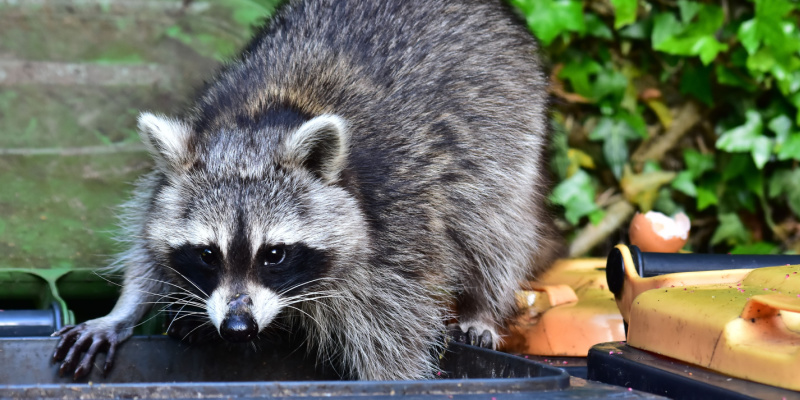Raccoons, often recognized by their distinctive black mask and bushy tail, are curious and adaptable creatures. While they might seem harmless or even entertaining when spotted in the wild, raccoons can become a significant concern for homeowners when they venture too close to our living spaces. But will these creatures actually cause damage to your home? The short answer is yes. Let’s delve into the ways raccoons can be problematic for homeowners.
Raccoons and Home Damage: What to Know
- Roof and Attic Damage: Raccoons are excellent climbers and often find their way onto roofs. Once there, they might tear off shingles, chew through vents, or exploit weak points to gain access to the attic. Once inside, they can cause further damage by tearing insulation, chewing on wires, and leaving droppings.
- Trash Disarray: One of the most common complaints from homeowners is raccoons getting into trash cans. They are adept at knocking over bins, removing lids, and scattering trash in search of food. This not only creates a mess but can also attract other pests.
- Lawn and Garden Destruction: Raccoons are omnivores, which means they eat both plants and small animals. They might dig up lawns in search of grubs or worms, and they won’t hesitate to help themselves to fruits, vegetables, or fish from garden ponds.
- Structural Damage: In their quest to find shelter or food, raccoons can cause damage to decks, sheds, and crawl spaces. They might tear apart insulation, chew on wooden beams, or dig underneath structures, compromising their stability.
- Disease Risk: While this isn’t direct damage to the home, it’s worth noting. Raccoons can carry diseases such as rabies, leptospirosis, and raccoon roundworm. Their droppings, if left unattended in or around homes, can pose health risks to humans and pets.
What Can Homeowners Do?
Understanding the potential damage raccoons can cause is the first step. The next step is to take proactive measures to deter these critters:
- Secure Trash Bins: Invest in sturdy trash cans with tight-fitting lids. If raccoons persist, consider using bungee cords or weights to keep the lids securely closed.
- Seal Entry Points: Regularly inspect your home for potential entry points, especially the roof, vents, and soffits. Use metal flashing, wire mesh, or other durable materials to seal off these areas.
- Protect Your Garden: If raccoons are raiding your garden, consider using fencing to keep them out. For fish ponds, netting or mesh can prevent raccoons from accessing the water.
- Avoid Leaving Food Out: If you have outdoor pets, make sure to bring in their food dishes at night. Similarly, clean up after barbecues or outdoor meals to ensure no food remnants attract raccoons.
- Seek Professional Help: If you notice signs of raccoon damage or suspect an infestation, it might be time to call a pest control company. Professionals can safely and humanely trap and relocate raccoons, as well as provide guidance on prevention.
Raccoons, while intriguing and sometimes endearing, can cause a range of problems when they decide to make a home too close to ours. From structural damage to health risks, the impact of a raccoon infestation is not to be taken lightly.
However, homeowners are not defenseless against these critters. By understanding the potential risks and taking proactive measures, it’s entirely possible to coexist with raccoons without them becoming unwelcome house guests. And if the problem becomes too significant to handle on your own, remember that professional pest control services are just a call away.
